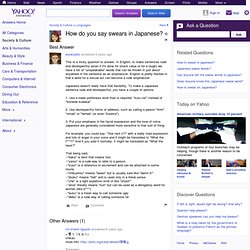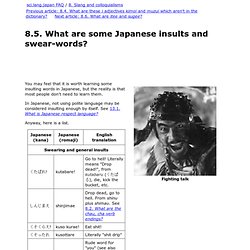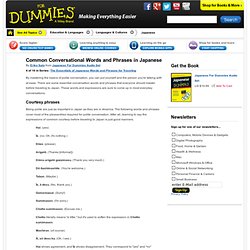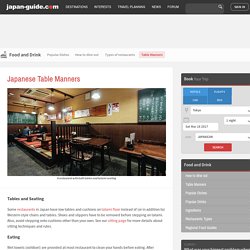

What is your favorite Japanese word(s) or sayings? [Archive] - Anime Forum dot Com. Ms.
![What is your favorite Japanese word(s) or sayings? [Archive] - Anime Forum dot Com](http://cdn.pearltrees.com/s/pic/th/favorite-japanese-sayings-77788277)
Lucy What is your favorite Japanese word(s) or sayings? My favorite words and sayings are... Ogama (Scythe) Aisuru (Beloved) Aishiteru (I Love you) Daikirai (I hate you) What is yours? Beautiful_Disaster My fave saying is Kanashii(sadness) [Boolean] My favorite Japanese word is the word for 1, ichi. Miss Moonlight. Japanese Tutorial: Swear Words and Much Much More. How do you say swears in Japanese? This is a tricky question to answer.

In English, to make sentences rude and disrespectful (even if it's done for shock value or for a laugh) we have a list of "unspeakable" words that can be thrown in just about anywhere in the sentence as an emphasizer. English is pretty flexible in that a word for a sexual act can become a rude emphasizer. Japanese doesn't really have that flexibility. To make a Japanese sentence rude and disrespectful, you have a couple of options: 1. 2. 3. For example, you could say, "Ittai nani o?! " That being said, --"baka" is term that means fool. What are some Japanese insults and swear-words? You may feel that it is worth learning some insulting words in Japanese, but the reality is that most people don't need to learn them.

In Japanese, not using polite language may be considered insulting enough by itself. See 13.1. What is Japanese respect language? Anyway, here is a list. Suffixes like me (奴) or yarou (野郎) may also be added to emphasize, like koshinuke yarou (腰抜け野郎) "cowardly git" or hentaime (変態奴) "pervo". See also 8.1. For books, see also for more offensive language. External links Housou kinshi yougoshuu (放送禁止用語集) [in Japanese] ("unbroadcastable language") contains a list of words which should not be broadcast, including racially discriminatory terms. Japanese Swear Words. Common Saying in Japanese [Archive] View Full Version : Common Saying in Japanese Lord Raiden Well, since the other thread is gone and I found this thread to be useful, let's fill it up again.
![Common Saying in Japanese [Archive]](http://cdn.pearltrees.com/s/pic/th/japanese-archive-animesuki-77788300)
Can you Please list the word (phenetic or plain text) and its meaning in Japanese? Things like "I'm sorry" and "Thank you". I know it will be helpful to many as it was very helpful to me. :) Thanks again everyone. Here is some... Arigatou = Thank you Gomen nasai = I'm sorry Sumimasen = Excuse me Tadaima = I'm home Okaerinasai = Welcome back Shimatta = Damn it!
Sakura-chan Konnichiwa = Hello Sayonara = So long Itte irashai = have a safe trip Suteki = wonderful Oyasumi / oyasumi nasai = Good night Itadakimasu = said before eating, not sure how to translate it Kakkoii = "cool" Kawaii = cute Kowai = scary Abunai = be careful Yoshi = all right Hayaku = hurry Matte = wait Yahari/ yappari = I thought so Hai / ee = yes Iie = no Betsu ni = nothing Mochiron = sure EDIT : Ohayou /ohayou gozaimasu = good morning Konbanwa = good evening gravitation.
Ten Favorite Japanese Expressions. How do you say 'mother', 'father' in Japanese? Common Conversational Words and Phrases in Japanese. 4 of 10 in Series: The Essentials of Japanese Words and Phrases for Traveling By mastering the basics of polite conversation, you can put yourself and the person you're talking with at ease.

There are some essential conversation words and phrases that everyone should master before traveling to Japan. These words and expressions are sure to come up in most everyday conversations. Courtesy phrases Being polite are just as important in Japan as they are in America. Hai. Īe. Dōzo. Arigatō. Dōmo arigatō gozaimasu. Dō itashimashite. Japanese Table Manners.
Tables and Seating Some restaurants in Japan have low tables and cushions on tatami floor instead of (or in addition to) Western style chairs and tables.

Shoes and slippers have to be removed before stepping on tatami. Also, avoid stepping onto cushions other than your own. See our sitting page for more details about sitting techniques and rules. Eating Wet towels (oshibori) are provided at most restaurant to clean your hands before eating. When eating from small bowls, it is correct manner to pick up the bowl with your hand and lead it close to your mouth when eating from it; however, larger types of dishes should generally not be picked up. Blowing your nose at the table, burping and audible munching are considered bad manners in Japan. After finishing your meal, it is generally good manner to return all your dishes to how they were at the start of the meal.
Rule of thumb: at the end of the meal, return all your dishes to how they were at the start of the meal (minus the food) Drinking.